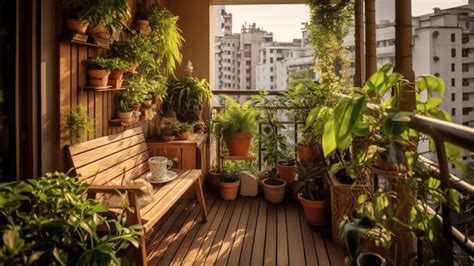The Influence of Weather on Balcony Gardening: Tips for Thriving Plants
Balcony gardening is a popular choice for urban dwellers seeking a connection to nature. However, weather plays a significant role in the success of these mini-gardens. Understanding how weather effects balcony gardening can help enthusiasts optimize plant health and yield, regardless of space constraints. This article delves into the impact of seasonal changes, microclimates, and practical gardening tips to overcome weather challenges.
Key Concepts
- Weather Effects: Changes in temperature, humidity, wind, and sunlight that impact plant growth.
- Balcony Gardening: The practice of growing plants in containers on a balcony, often in urban environments.
- Microclimates: Localized climates influenced by the unique position of a balcony, impacting temperature and humidity.
- Container Gardening: Growing plants in pots or containers rather than in the ground, especially in confined spaces.
- Plant Health: The overall condition of plants, influenced by factors like water, nutrients, and environmental conditions.
Historical Context
Balcony gardening has evolved alongside urbanization. In densely populated cities, people began utilizing small outdoor spaces to cultivate greenery. Weather has always been a primary concern, but technological advances like irrigation systems and frost covers have improved the ability to counteract adverse conditions. Early balcony gardeners relied on trial and error, learning over time which plants could endure various weather effects.
Current State Analysis
Today, balcony gardening has gained popularity thanks to its environmental and mental health benefits. However, modern challenges such as unpredictable weather patterns and urban heat islands require gardeners to adapt. Many urban gardeners experience seasonal changes more acutely due to the lack of natural ground cover, exposing plants to extreme temperatures. The rise in container gardening allows greater mobility and flexibility, but also introduces challenges like water retention and soil overheating during hot weather.
Practical Applications
- Heat Management: Use reflective materials around plants to reduce heat absorption. Consider watering plants in the early morning or late evening to prevent water evaporation.
- Wind Protection: Use windbreaks such as trellises or taller plants to shield delicate species. Avoid placing lightweight containers in exposed areas where strong gusts can topple them.
- Frost Protection: Invest in frost cloths or use blankets to cover plants during unexpected cold snaps. Mulching the soil can also insulate roots from temperature fluctuations.
- Watering Solutions: Self-watering containers can regulate moisture, particularly during dry seasons.
Case Studies
| Location | Weather Challenge | Solution | Outcome |
|---|---|---|---|
| New York, USA | Winter Frost | Frost cloths and insulation | Plants survived the cold, minimal damage |
| Los Angeles, USA | High Heat | Shade cloth and reflective materials | Reduced heat stress, plants thrived |
| London, UK | Frequent Rain | Raised containers for drainage | Improved plant health, no waterlogging |
Stakeholder Analysis
Balcony gardening affects a variety of stakeholders, including urban gardeners, city planners, environmentalists, and product manufacturers. Urban gardeners are directly impacted by weather fluctuations and must make informed decisions about plant selection and care. City planners benefit from understanding how balcony gardening can contribute to urban green spaces. Environmentalists advocate for the practice as a means to increase biodiversity and reduce the urban heat island effect, while product manufacturers develop tools and solutions to support weather-resilient gardening techniques.
Implementation Guidelines
- Research the weather patterns in your area to choose appropriate plants.
- Invest in high-quality containers that provide proper drainage and insulation against heat and cold.
- Set up an irrigation system or use self-watering pots to manage water during dry spells.
- Use frost covers and windbreaks to protect plants from extreme weather conditions.
- Regularly check weather forecasts to adjust watering and protection measures as needed.
Ethical Considerations
Balcony gardening can contribute positively to environmental sustainability by reducing the need for transported produce and creating green spaces in urban areas. However, there are ethical concerns about the sourcing of certain gardening products. For example, the extraction of peat moss for gardening can have a significant environmental impact. Gardeners should aim to use eco-friendly products like coconut coir as an alternative. Additionally, ensuring that plants and gardening materials are sourced from sustainable suppliers is crucial for minimizing the ecological footprint of balcony gardening.
Limitations and Future Research
One limitation of balcony gardening is the confined space, which limits the variety and number of plants that can be grown. Weather can exacerbate these limitations, as extreme heat, cold, or wind may damage vulnerable plants. Future research could focus on developing more resilient plant varieties specifically suited to urban environments. Additionally, innovations in container design and urban microclimates could help mitigate the negative effects of weather. Further studies on the role of balcony gardens in combating urban heat islands and promoting biodiversity would also benefit this growing field.
Expert Commentary
Experts in urban gardening emphasize the importance of understanding microclimates. Dr. Lisa Stevens, an urban ecologist, explains, “A balcony’s position can significantly affect its microclimate. South-facing balconies may require more shade, while north-facing ones may need additional sunlight exposure.” Additionally, plant expert George Whitman highlights the importance of adaptable plant species: “Opt for hardy plants like succulents or herbs, which can survive a range of weather conditions.”
Weather impacts every aspect of balcony gardening, from plant selection to daily care. By understanding how to adapt to different weather conditions, gardeners can create thriving outdoor spaces even in the heart of a city.


